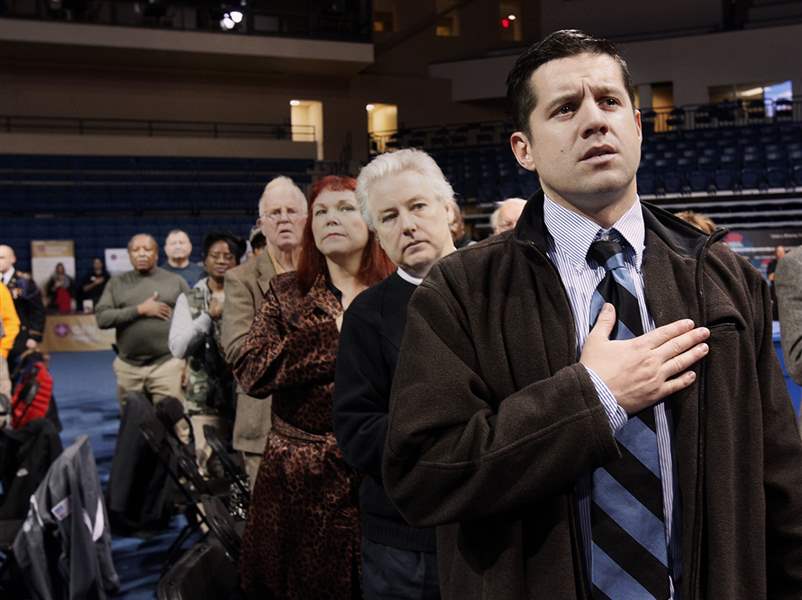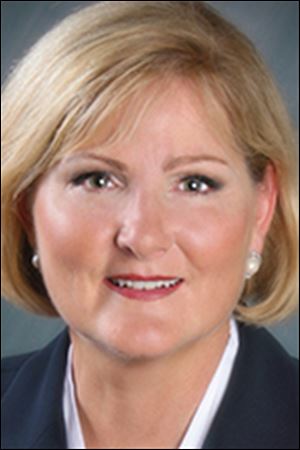
HONORING THOSE WHO SERVE
UT student studying why fellow veterans struggle to find jobs
11/11/2013
Alex Laverde, 28, of Toledo joins in singing the National Anthem during a Veterans Day appreciation ceremony at the University of Toledo. Mr. Laverde, a UT senior, enlisted in the Army shortly before graduating from Central Catholic High School in 2003 and has served three tours in Iraq.
THE BLADE/JETTA FRASER
Buy This Image

Alex Laverde, 28, of Toledo joins in singing the National Anthem during a Veterans Day appreciation ceremony at the University of Toledo. Mr. Laverde, a UT senior, enlisted in the Army shortly before graduating from Central Catholic High School in 2003 and has served three tours in Iraq.

Fedor
One veteran at the annual Veterans Day celebration at the University of Toledo sat up and took special notice Monday when state Rep. Teresa Fedor (D., Toledo) began talking about the high unemployment rate for Ohio veterans.
UT senior Alex Laverde, an Army Reservist who served three deployments to Iraq, has launched a research project addressing employment reintegration issues facing younger veterans when they return.
PHOTO GALLERY: Veteran's Appreciation Breakfast at UT
As he knows from personal experience and the experiences of his fellow service men and women, many veterans cannot find good jobs. Some employers don’t recognize that the skills acquired in the military can make veterans good employees. He wants to find out how area companies have benefited from hiring veterans, and he hopes to come up with solutions to the employment barriers many face.
“I am reaching out to the community,” Mr. Laverde, 28, said. “This is an issue that needs the attention of the community.”
At the ninth annual Veterans Appreciation Breakfast and Resource Fair at UT’s Savage Arena, Ms. Fedor, who also is a veteran, said Ohio veterans have an unemployment rate that’s twice as high as the civilian rate. She said she frequently asks returning service men and women how long it took them to find a good job after returning to civilian life. On average, she said, they say a year and a half.
The state legislature recently approved a bill that requires the state’s occupational licensing agencies to recognize military training and experience toward the requirements to receive that license, but, Ms. Fedor said, there is still much to be done.
“Easing veterans’ issues as they come home should be a priority,” she said.
U.S. Rep. Marcy Kaptur (D., Toledo) said the new Veterans Administration clinic on South Detroit Avenue is a huge improvement for local veterans, but she implored Toledo Mayor Mike Bell and Mayor-elect D. Michael Collins to continue to fight for veterans services as well as badly needed housing for veterans.
Mr. Bell, for his part, pointed out to the crowd at Savage Arena that Toledo soon will have mayor who is a Marine Corps veteran. He congratulated Mr. Collins on his successful campaign for the mayor’s office then thanked him — and all of the 350 veterans in attendance — for their service to the country.
“It is because of you, we are [here], so thank you very much,” Mr. Bell said.
Keynote speaker Victor E. Renuart, Jr., a retired four-star general, said Ohio has sent the eighth largest number of men and women into the Armed Services — more than 890,000 since the beginning of World War II. Nearly 650,000 Ohioans have served in combat.
“People in Ohio know how to stand up and say, ‘Send me,’ ” he said.
Mr. Laverde, who joined the Army Reserve just before graduating from Central Catholic High School in 2003, said he hopes to spur the community to show its appreciation to veterans by employing them and easing their transition to civilian life.
“My theory is that through the process of proper employer-to-service member relationship, that can very possibly influence the service member’s well-being back here in the civilian world — to gain back their identity, find their place in society, and really overcome that barrier of readjustment from war to civilian,” Mr. Laverde said.
He said the challenge only is going to intensify as the military increasingly relies on reservists and National Guardsmen.
Mark Sherry, an associate professor of sociology at UT, said he is working with Mr. Laverde on his thesis project in part because of the credibility Mr. Laverde brings to it as a veteran.
“When Alex first came to me, he said we don’t want to picture these people as victims, and the other thing he said was, they have stepped up for the community and it’s time for the community to step up for them,” Mr. Sherry said.
Employers, veterans, and community members interested in Mr. Laverde’s project may contact him at alav1117@gmail.com.
Contact Jennifer Feehan at: jfeehan@theblade.com or 419-213-2134.